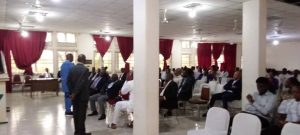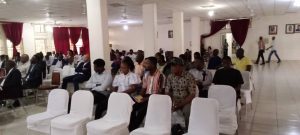By Tina Amanda
The University of Port Harcourt Teaching Hospital (UPTH) has encouraged the public to request minimally invasive techniques when undergoing surgeries.
This appeal was made by the Chairman of the Medical Advisory Committee, Professor Datonye Alasia, during the hospital’s monthly grand rounds organized by the Minimal Access Surgery Unit. The event, themed “Minimal Access Surgeries in UPTH: Past, Present and Future,” highlighted the benefits of these advanced surgical methods.
Professor Alasia noted UPTH’s significant achievements in minimally invasive surgeries for women, children, and adults. He emphasized that the procedures are not only more efficient but also more cost-effective compared to traditional open surgeries.
He further explained that the hospital is expanding its use of these advanced techniques, moving away from conventional open-incision methods.
“The aim of the grand round is to create an avenue for cross-fertilization ideas, discuss achievements and challenges facing the different departments in the hospital, as well as create awareness to members of the public about specialized and high-end services which the hospital provides.
“So today’s ground rounds were focused on minimally invasive or access surgeries, talking about those procedures you carry out without putting a big cut to gain access to the surgical site using cameras and some delicate equipment either to diagnose what the problem is or to offer treatment which could be surgical.
“This cuts across various areas, the intestinal tract, the chest, thorax lungs, the heart, the brain, kidneys, and urinary tract, obstetrics and gynecology, and even children.
“What we have today was a summation of all of those services and so we have been able to see a whole lot of interesting things that have given benefits to many patients and of course, those services would have come at a cost that is more affordable and competitive because of you were to pay for those services in other places, it would actually cost a bit more.
“So we are working to see how we can scale up the extent of the minimal access services so that we can do much more than we are currently doing now”.
“The traditional open method is okay, but the advantages of this minimal access technique are less pain afterward, early recovery, and early return to work.
“We have demonstrated from the cases that we put together that this is possible. So the public should go towards demanding minimal access techniques whenever surgery is to be done, in UPTH, a lot is happening despite the challenging times.”
The Director, of UPTH Minimal Access Surgery Programme, Professor Emeka Ray-Offor, urged the Federal Government to implement policies preventing public officials from seeking medical treatments abroad for surgeries and other healthcare services readily available in Nigeria.
He emphasized that such measures would not only strengthen the country’s healthcare system but also ensure accountability and boost confidence in local medical expertise.
Professor Ray-, however, called on the government to strengthen specialized regional medical centers in the country to discourage medical tourism abroad.
“We should really look inwards to solving our problems, if the amount of money given to civil servants to go for medical treatments abroad is brought home and you have dedicated centers regionally and well funded, it will help to address these challenges. Although the government cannot do all of it, we have good-natured individuals in the private sector who can get involved.
“The government should make concerted efforts to encourage some of those practices that people are going abroad for and put a policy that no treatment available here should be sought abroad, if they are doing that, things would improve, for example, if you come to the hospital and hear that the governor is admitted in one ward, when you have a health challenge, you will equally go to the same place where the governor was admitted.
“We need to identify our strengths and strengthen them even more through regional centers, it is pretty capital intensive to have these technology-dependent practices in every state, so to say, regional centers, equip them, instead of sending people outside for medical tourism”.






